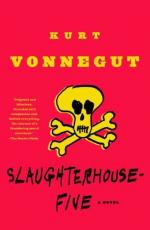|
This section contains 161 words (approx. 1 page at 400 words per page) |

|
Clark Mayo, Kurt Vonnegut. The Gospel from Outer Space; or, Yes We Have No Nirvanas, Borgo Press, 1977, pp. 45-52.
Discusses Slaughterhouse-Five as a response to "the horror and absurdity of war" with emphasis on the novel's unconventional structure.
Leonard Mustazza, Forever Pursuing Genesis' The Myth of Eden in the Novels of Kurt Vonnegut, Bucknell University Press, 1990, pp 102-15.
Discusses Slaughterhouse-Five in terms of Billy Pilgrim's attempts "to construct for himself an Edenic experience" and the "linkage. between Eden and Tralfamadore.
Peter J. Reed, Kurt Vonnegut, Jr., Crowell, 1972, pp. 172-203.
Discusses Slaughterhouse-Five as "an effort to bring together all that Vonnegut has been saying about the human condition and contemporary American society". Reed calls the novel "remarkably successful" and "one of Vonnegut' s best:'
Stanley Schatt, Kurt Vonnegut, Jr., G.K. Hall, 1976, pp. 81 96.
A detailed summary and critique of the novel. The...
|
This section contains 161 words (approx. 1 page at 400 words per page) |

|




